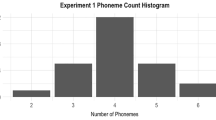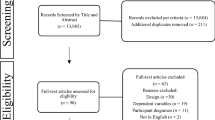Abstract
This experiment investigated the possibility that autistic adolescents may avoid speech communication with the world around them by “tuning out” or perceptually suppressing auditory speech stimuli. The tune-out auditory supression hypothesis was investigated using the subject's own speech as the stimulus under three perceptual-motor conditions: (1) with speech in a delayed auditory feedback (DAF) mode, (2) with a white noise masking speech mode, and (3) with speech in a normal, quiet listening mode. Five autistic adolescents were compared with six normal controls on speech time duration and sound level. DAF increased the speech sound pressure level (SPL) and increased speech time duration for both groups.
Similar content being viewed by others
References
Arens, C. J., & Poppleston, J. Q. Verbal facility and delayed speech feedback.Perceptual and Motor Skills, 1959,9, 270.
Baltaxe, C., & Simmons, J. Q. Language in childhood psychosis: A review.Journal of Speech and Hearing Disorders, 1975,40, 429–458.
Baltaxe, C., & Simmons, J. Q. Language patterns of German and English autistic adolescents. In P. Mittler (Ed.),Proceedings of the International Association for the Study of Mental Deficiency. Baltimore: University Park Press, 1977. Pp. 267–278.
Bartak, L., Rutter, M., & Cox, A. A comparative study of infantile autism and specific developmental receptive language disorders. III. Discriminant function analysis.Journal of Autism and Childhood Schizophrenia, 1977,7, 383–396.
Belmore, N. F., Kewley, P. D., Mobley, R. L., & Goodman, V. E. The development of auditory feedback monitoring: Delayed auditory feedback studies on the vocalizations of children aged six months to nineteen months.Journal of Speech and Hearing Research, 1973,16(4), 709–720.
Bender, L. Childhood schizophrenia.Nervous Child, 1942,1, 138–140.
Bender, L. Schizophrenia in childhood: A clinical study of one hundred schizophrenic children.American Journal of Orthopsychiatry, 1947,17, 40–56.
Bergman, P., & Escalona, S. Unusual sensitivities in very young children.Psychoanalytic Study of the Child, 1949, 333–352.
Black, J. W. The persistence of the effects of delayed sidetone.Journal of Speech and Hearing Disorders, 1955,20, 65–68.
Blackstock, E. G. Cerebral asymmetry and the development of early infantile autism.Journal of Autism and Childhood Schizophrenia, 1978,8, 339–353.
Boller, F., Vrtunski, P. B., Kim, Y., & Mack, J. L. Delayed auditory feedback and aphasia.Cortex, 1978,14(2), 212–226.
Burke, B. D. Variables affecting stutterer's initial reations to delayed auditory feedback.Journal of Communicable Diseases, 1975,8(2), 141–155.
Cantwell, D. P., Baker, L., & Rutter, M. Families of autistic and dysphasic children. II. Mothers' speech to children.Journal of Autism and Childhood Schizophrenia, 1977,7, 313–327.
Cantwell, D. P., Baker, L., & Rutter, M. A comparative study of infantile autism and specific developmental receptive language disorder. IV. Analysis of syntax and language function.Journal of Child Psychology and Psychiatry, 1978,19, 351–362.
Cooper, W. A., Jr., Stokinger, T. E., & Billings, B. L. Pure tone delayed auditory feedback. Effect of hearing loss on disruption of tapping performance.Journal of the American Audiological Society, 1977,3(2), 102–107.
Copeland, R. H. The effects of feedback modification on verbal behavior.Journal of Speech and Hearing Disorders, 1963,10(Monogr. Suppl.), 70–74.
Dawson, G.Early infantile autism and cerebral hemispheric specialization. Unpublished doctoral dissertation, University of Washington, 1979.
Elias, J. W., Yairi, E., Wright, L., Adams, L. A., & Villescas, R. The use of delayed auditory feedback in the identification of the left cerebral hemisphere as a temporal/duration processor.Journal of Auditory Research, 1977,17(3), 155–160.
Fairbanks, G. Selective vocal effects of delayed auditory feedback.Journal of Speech and Hearing Disorders, 1955,30, 333–345.
Fillenbaum, S., & Wiesen, R. Contextual constraints and disruption in reading with delayed auditory feedback.Journal of the Acoustical Society of America, 1961,33, 1800–1801.
Forney, R., Martz, R., Lemberger, L., & Rodda, B. The combined effect of marihuana and dextroamphetamine.Annals of the New York Academy of Sciences, 1976,281, 162–170.
Garber, N. B. Effects of delayed auditory feedback on children with disorders in auditory processing.Journal Communicable Diseases 1973,6(2), 134–144.
Goldfarb, W., & Braunstein, P. Responses to delayed auditory feedback in schizophrenic children. In P. H. Hoch & J. Zubin (Eds.),Psychopathology of communication, New York: Grune and Stratton, 1958.
Goldfarb, W., Braunstein, P., & Lorge, I. A study of speech patterns in a group of schizophrenic children.American Journal of Orthopsychiatry, 1956,26, 554–555.
Jack, W. H., & Herbert, B. H. Delayed auditory feedback with dyslexies.Journal of Educational Research, 1975,68(9), 338–340.
Kanner, L. Autistic disturbances of affective contact.Nervous Child, 1943,2, 217–250.
Kodman, E. Controlled reading rate under delayed speech feedback.Journal of Auditory Research, 1961,1, 186–193.
Lee, B. S. Effects of delayed speech feedback.Journal of the Acoustical Society of America, 1950,22, 824–826.
Lee, B. S. Artifical stutter.Journal of Speech and Hearing Disorders, 1961,16, 53–55.
Lovaas, O. I., & Schreibman, L. Stimulus overselectivity of autistic children in a two-stimulus situation.Behavior Research and Therapy, 1971,9, 305–310.
Lozano, R. A., & Dreyer, D. E. Some effects of delayed auditory feedback on dyspraxis of speach.Journal of Communicable Diseases, 1978,11(5), 407–415.
MacKay, D. C. How does language familiarity influence stuttering under delayed auditory feedback?Perceptual and Motor Skills, 1970,30, 665–669.
McCormick, B. Therapeutic and diagnostic applications of delayed auditory feedback.British Journal of Disorders of Communition, 1975,10(2), 98–110.
Nober, E. H. Physiogenic auditory problems in adults. In R. Rieber & R. Brubaker (Eds.),Speech pathology. Amsterdam: North Holland, 1966. Pp. 182–209.
Novak, A. The influence of delayed auditory feedback in stutterers.Folia Phoniatrica (Basel), 1978,30(4), 278–285.
O'Malley, H. Assumptions underlying the delayed auditory feedback task in the study of ear advantage.Brain and Language, 1978,5(1), 127–135.
Ornitz, E., & Ritvo, E. Perceptual inconstancy in early infantile autism.Archives of General Psychiatry, 1968,18, 77–98.
Ornitz, E., & Ritvo, E. Medical assessment. In E. Ritvo (Ed.),Autism: Diagnosis, current research and management. New York: Spectrum, 1976. Pp. 7–26.
Peters, H. N. Interaction of delayed speech feedback, metalingual factors, and chronic schizophrenia.Journal of Speech and Hearing Disorders, 1962,27, 359–367.
Robinson, G. M. The delayed auditory feedback effect is a funtion of speech rate.Journal of Experimental Psychology, 1972,95(1), 1–5.
Roehrig, W. C. Addition of controlled distortion to delay of auditory feedback.Perceptual and Motor Skills, 1965,21, 407–413.
Rostron, A. B. Pitch control in the human voice.Quarterly Journal of Experimental Psychology, 1976,28(2), 305–310.
Rutter, M. Prognosis: Psychotic children in adolescence and early adult life. In J. Wing (Ed.),Early childhood autism: Clinical, educational, and social aspects. London: Pergamon Press, 1966. Pp. 83–100.
Rutter, M. Concepts of autism: A review of research.Journal Child Psychology and Psychiatry, 1968,9, 1–25.
Rutter, M., Greenfeld, D., & Lockyer, L. A five to fifteen year follow-up study of infantile psychosis. I. Description of sample.British Journal of Psychiatry, 1967,113, 1169–1182.
Salter, D. Transformations: I. The effect of DAF of sentence generation.Journal of Psycholinguistic Research, 1976,5(1), 21–32.
Shapiro, T., Roberts, A., & Fish, B. Imitation of echoing in young schizophrenic children.Journal of the American Academy of Child Psychiatry, 1970,9, 548–565.
Siegal, S.Non-parametric statistics for the behavioral sciences. New York: McGraw-Hill, 1956.
Simmons, J. Q., & Baitaxe, C. Language patterns of adolescent autistics.Journal of Autism and Childhood Schizophrenia, 1975,5, 333–351.
Simmons, J. Q., & Tymchuk, A. The learning deficits in childhood psychosis.Pediatric Clinics of North America, 1973,20, 665–675.
Smith, K. U.Delayed sensory feedback and behavior. Philadelphia: Saunders, 1962.
Spear, F. G. Delayed auditory feedback; some effects on the speech of psychiatric patients.British Journal of Psychiatry, 1963,109, 235–239.
Spear, F. G., & Bird, R. L. Delayed auditory feedback vocal intensity changes in schizophrenia.British Journal of Psychiatry, 1963,109, 240–242.
Spilka, B. Relationships between certain aspects of personality and some vocal effects of delayed auditory feedback.Journal of Speech and Hearing Disorders, 1954,19, 491–503.
Stromsta, C. Delays associated with certain sidetone pathways.Journal of the Acoustical Society of America, 1962,34, 392–396.
Sullivan, R. R., Polisar, I. A., Ruffy, M. L., & Miller, M. H. Relative influence of the Lombard and delayed auditory feedback tests for functional hearing loss on phonation/time ratio.Journal of Auditory Research, 1973,13(1), 50–63.
Sutton, S., Roehrig, W., & Kramer, J. Delayed auditory feedback of speech in schizophrenics and normals.Annuals of the New York Academy of Sciences, 1964, 832–844.
Tanguay, P. Clinical and electrophysiological research. In E. Ritvo (Ed.),Autism: Diagnosis, current research and management. New York: Spectrum, 1976.
Tiffany, W. R., & Hanley, C. Adaptation to delayed sidetone.Journal of Speech and Hearing Disorders, 1956,21, 164–172.
Timmons, B. A., & Boudreau, J. P. Age, sex, and delay time as factors affecting reaction to delayed auditory feedback.Perceptual and Motor Skills, 1978,46(2), 551–555.
Vinar, O., Bastecky, J., Borovickova, B., Delayed auditory feedback in schizophrenia and LSD-induced states.Activitas Nervosa Superior (Praha), 1965,7, 302–303.
Watson, S. J. Effect of delayed auditory feedback on process and reactive schizophrenic subjects.Journal of Abnormal Psychology, 1974,83(6), 609–615.
Wikis, J. J. Psychological stress reactions to a simulated disability.Dissertation Abstracts International, 1974,34(9-B), 4647–4648.
Author information
Authors and Affiliations
Rights and permissions
About this article
Cite this article
Nober, E.H., Simmons, J.Q. Comparison of auditory stimulus processing in normal and autistic adolescents. J Autism Dev Disord 11, 175–189 (1981). https://doi.org/10.1007/BF01531683
Issue Date:
DOI: https://doi.org/10.1007/BF01531683




